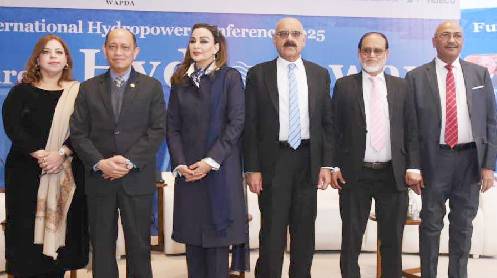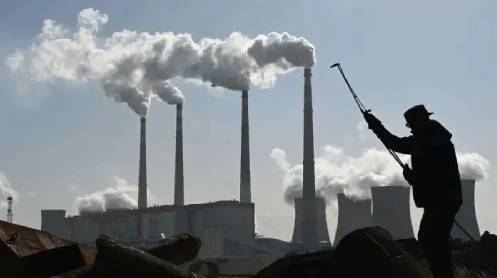Speakers at day long International Hydropower Conference while terming sustainable energy critical for development of any country on Thursday stressed the need for harnessing the untapped hydel potential to meet Pakistan’s future growing energy demands.
Islamabad: The 4th International Hydropower Conference 2025, hosted by Energy Update in collaboration with the Private Power Infrastructure Board (PPIB) and the International Hydropower Association, brought together industry leaders, policymakers, and global experts to discuss hydropower’s transformative role in shaping a sustainable energy future for Pakistan.
The speakers highlighted various challenges, including the significant financing and long timelines required to construct large dams and establish hydropower projects.
Speaking at the conference, Senator Sherry Rehman stated that sustainable, affordable energy is vital for the country’s development. “Pakistan has immense hydropower potential,” she said. Rehman stressed that every household and business activity depends on affordable and sustainable energy. She pointed out that global conflicts often disrupt energy supply chains and added, “Pakistan has been heavily dependent on imported fossil fuels, but it’s time for us to switch to renewable energy sources like wind and solar. This shift will not only help reduce carbon emissions, the primary cause of global warming, but also ensure energy security.”
Rehman also noted that although Pakistan contributes less than one percent to global carbon emissions, it is committed to generating 50-60% of its power through renewable energy and hydropower. She further stated, “The world is transitioning to renewable energy to meet its energy requirements. Pakistan’s two major dams are insufficient to provide a stable power supply. We should not rely solely on large dams due to their high costs and extended completion timelines. Investment in small hydropower projects is crucial.”
Managing Director of PPIB, Dr. Shah Jehan Mirza, revealed that of the total identified 64,000 MW hydropower potential in Pakistan, only 11,000 MW is currently being utilized. He explained that while hydropower projects have significant benefits, they typically take 7-8 years to complete, and lenders are often reluctant to finance such large-scale initiatives. However, he noted the government’s success in attracting substantial investment in the power sector, citing the Karot and Sukki Kinari hydropower projects as examples. Mirza added that Pakistan is not performing poorly, as green energy accounts for 52% of its total energy mix. The government has also planned to phase out old thermal plants with a combined capacity of 7,000 MW.
Malaysian High Commissioner Dato’ Mohammad Azhar Mazlan commended the conference organizers and emphasized that energy is the backbone of a country’s economy. He remarked that, like Pakistan, Malaysia is blessed with abundant natural resources and generates electricity through hydropower, gas, and other sources. Mazlan stressed the need to develop indigenous technology for hydropower generation and praised Pakistan’s “Uraan Pakistan” program under the leadership of Prime Minister Shehbaz Sharif.
General Manager of WAPDA, Tanveer Mujahid, underscored the importance of clean and green energy for the country’s development. “WAPDA is committed to a strategic vision of tapping Pakistan’s hydropower potential,” he said. Mujahid explained that hydropower currently constitutes 30% of the total energy mix, and WAPDA is actively pursuing various projects to add more clean energy to the system. He shared that around 10,000 MW of clean energy will be added to the national grid through projects like Diamer Basha Dam (4,500 MW), Mohmand Dam (800 MW), Dasu Stage 1 (2,150 MW), and Tarbela 5th Extension Project (1,510 MW). He added that these projects would also support food security by ensuring water availability for agriculture.
CEO of TNB REMACO, Hafiz Isahak, highlighted his organization’s expertise in providing maintenance, repair, diagnostic, and project management services for the power sector in Malaysia and other countries, including Kuwait and Saudi Arabia. He shared examples of their partnerships in Pakistan, such as the Balloki Combined Cycle Power Plant (1,223 MW) and the New Bong Escape Hydropower Plant (84 MW).
Dr. Muzammil Zia, focal person for the China-Pakistan Economic Corridor (CPEC), described CPEC as a game-changer for Pakistan’s power sector. He noted that 17 power projects with a combined capacity of 9,000 MW were established under CPEC’s early harvest plan, including the 720 MW Karot and 840 MW Sukki Kinari hydropower projects.
Other speakers, including GM of China International Group Company Wang Huihua and Dr. Jehanzeb Nasir, Ch. Abdul Rasheed, Minister Hydel & Power AJK, Azam Joya-GM C&M Water , Dr. Irfan Yousaf- CEO MKAI Climate Consulting , AVM Ijaz Malik-Disaster Management Specialist, Zafar Iqbal Wattoo-RHC addressed the prospects and challenges facing hydropower projects in Pakistan.
Earlier, M. Naeem Qureshi, Managing Editor of Energy Update, welcomed participants to the conference and described it as a milestone in promoting the hydropower sector in the country.




